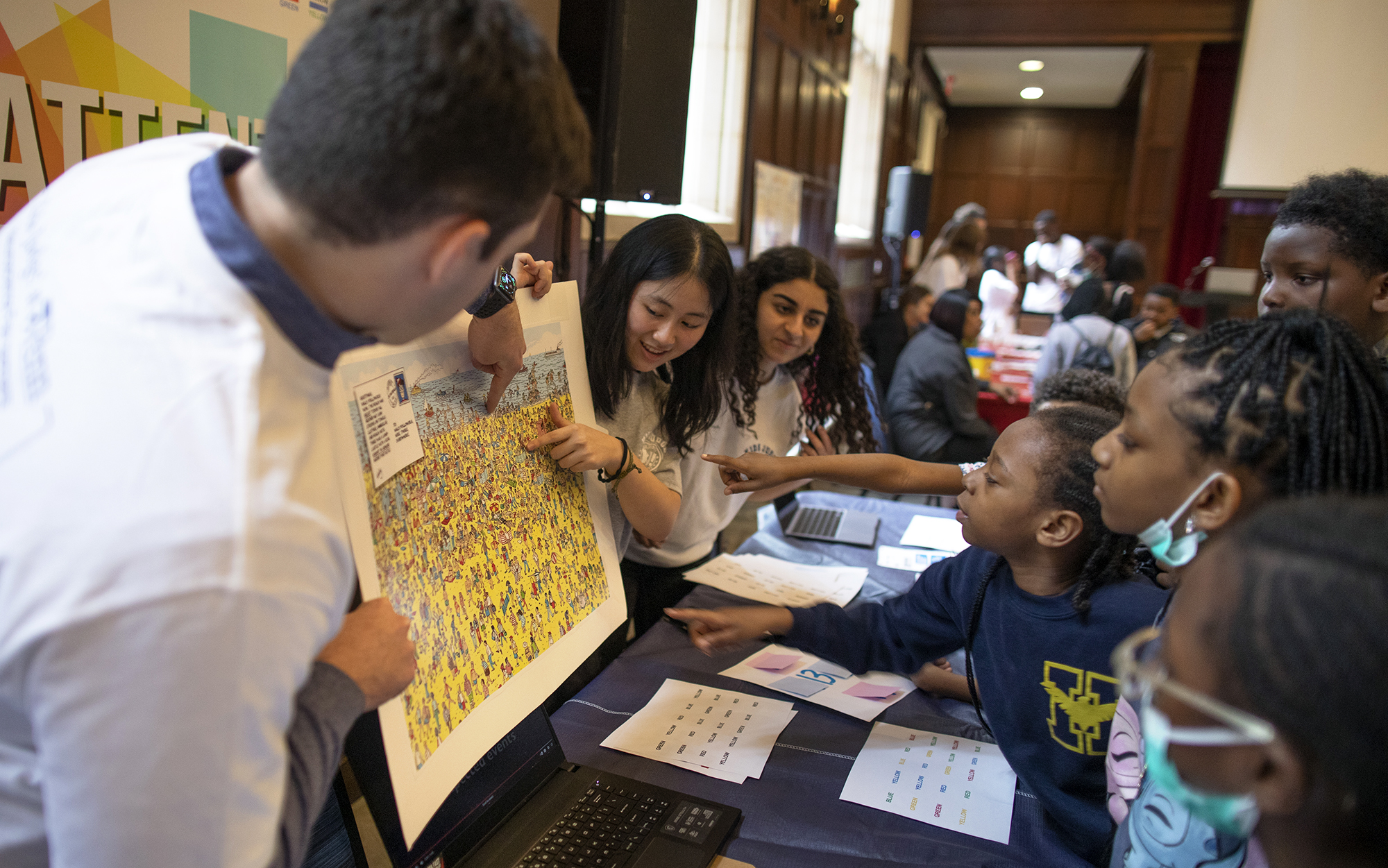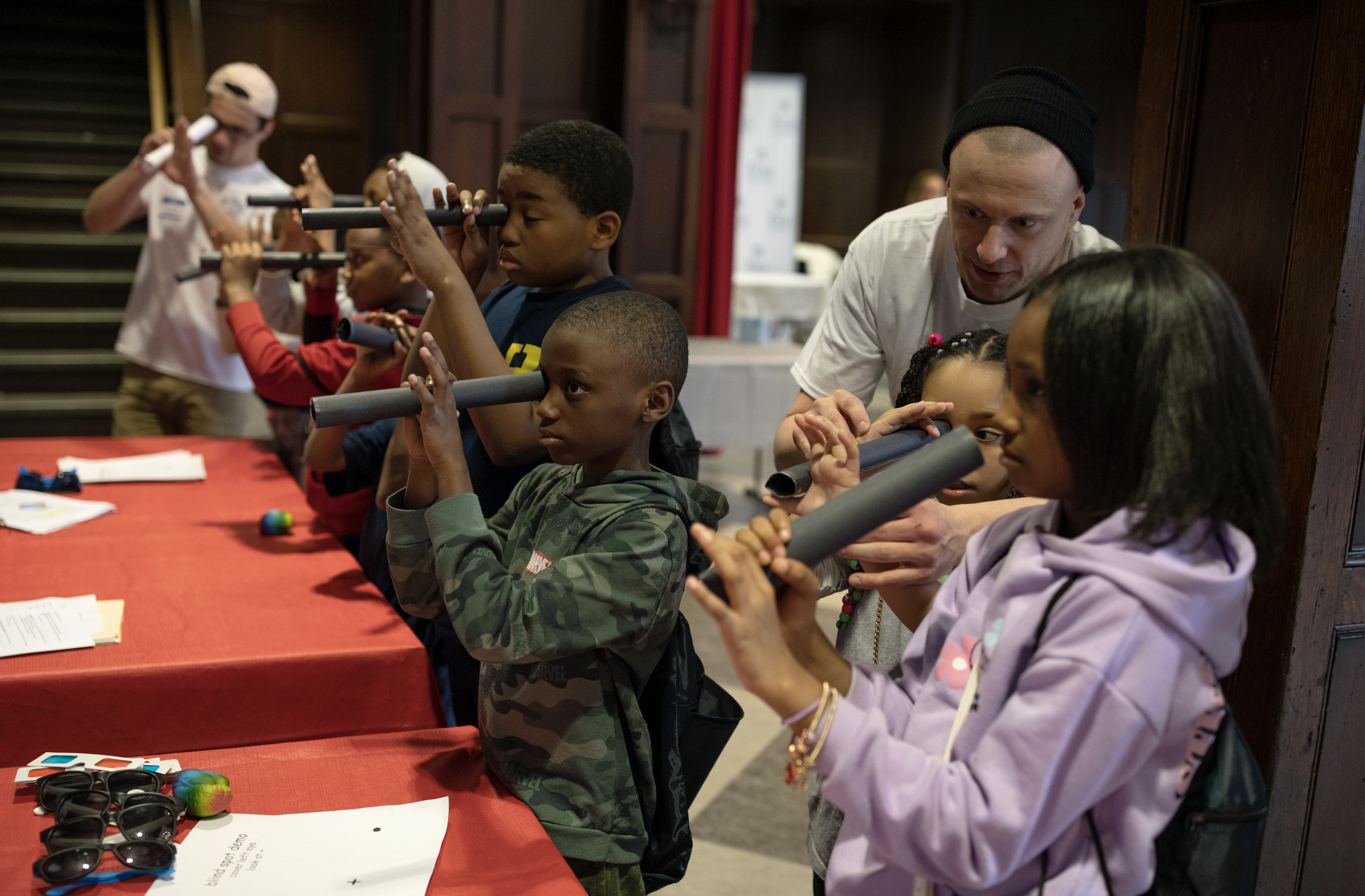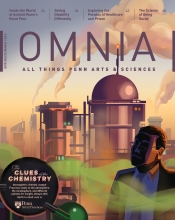Marshmallows and Brains and the Body Electric
The Kids Judge! Neuroscience Fair lets Philly schoolkids try out and judge science exhibits put together by Penn Arts & Sciences students.

“I learned that when you throw marshmallows at people’s eyes, they back up or flinch without thinking,” said third-grader J.O.
Fellow third-grader Missouri liked the reflex exhibit, too. “Whenever you shine a light in someone’s eye, the pupil gets smaller so less light can get in,” she says. “I also learned that when you tap someone’s knee, their leg will fly out. Everything is connected.”
In the fourth-grade contingent, Layla enjoyed learning about attention (“When we were watching a video and really focusing, there were two other things going on and we didn’t even notice”), while Nivea liked discovering the relationship between eyesight and the brain.
The children were among 66 third- and fourth-graders from Hamilton Elementary who came to Penn for the Kids Judge! Neuroscience Fair on March 24. Held for the first time since 2019 due to the COVID-19 pandemic, Kids Judge! has Penn Arts & Sciences undergraduate and graduate students from neuroscience fields design exhibits that demonstrate how the brain and nervous system function. The elementary students check out and judge the projects, in a flip-flop of a traditional science fair.
This reversal of roles is designed to make the scientists better communicators and to interest young children in science. Kids Judge! 2023 had the visiting students trying out exhibits like Body Electric, where they see how electrical impulses can control our muscles. In Don't Believe Your Eyes, take-home bouncy balls that looked like eyeballs were used to demonstrate the human eye's blind spot. And Brainapalooza had them dissecting sheep brains.
“It’s really cool because we’re not gatekeeping neuroscience and they actually get to know what a brain looks, feels, and smells like,” said neuroscience major Olivia Rivellini, C’23. “They think it’s gross, but they also really enjoy the experience … It’s very new to them.”
“We got to cut a real brain,” stated Nivea. “I learned that there are parts of the brain that have different jobs, like long-term memory.”
Grace Widelitz, C’23, a cognitive science major, was impressed at the curiosity and involvement of the children: “It’s been so amazing to see these kids excited about neuroscience and really asking a lot of questions, digging in and taking guesses.”
“I think the coolest thing about today is seeing the kids learn something about themselves, and be introduced to the brain, biology, sciences, and maybe spark something for them that could carry on,” says biology major John Stout, C’24. “I know that happened to me as a kid, so it’s cool to see that I might be putting another person on that path as well.”
“It’s lovely having these kids coming in so eager to learn,” adds Dominic Duah, C’23, a neuroscience major. “I enjoy having the opportunity to explain some of these really intriguing concepts in a very simple way and just have the kids be overjoyed to learn whatever it is, whether it be electricity or muscle contractions or vision… It’s just great.”
Third-grade teacher Linda Wilkerson said that the event gives the students insight into the world of science, “all of the different things, from the brain to reflexes and hearing. I love that it’s very interactive. It holds their interest and they are learning a lot.”
“This is an amazing experience for the kids that connects to so many standards in math, science, reading, and social studies, and it wouldn’t have happened without this field trip,” adds fourth-grade teacher Allison Kline. “I think they are going to truly remember this and use what they’ve learned back in the classroom.”
The Kids Judge! Neuroscience Partners are from the Undergraduate Neuroscience Program (Arts & Sciences); the Mahoney Institute of Neurological Sciences Graduate Group and Machine Shop; Stellar Program on Neuroscience and Society, Office of Diversity and Community Outreach (Medicine); Access Science; Netter Center for Community Partnerships, Provost’s Interdisciplinary Seminar Fund, Office of the Provost; and the Penn Neuroscience Society (undergraduate student organization). Andrew Hamilton Elementary students attended through the school's long-standing partnership with the Netter Center for Community Partnerships as one of Netter's University-Assisted Community Schools (UACS). In addition, a few high school students from Paul Robeson High, another Netter Center UACS location, also attended.





